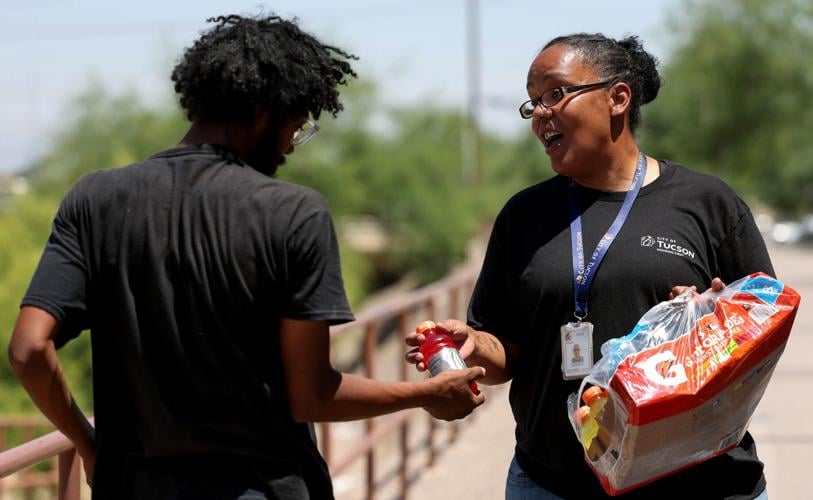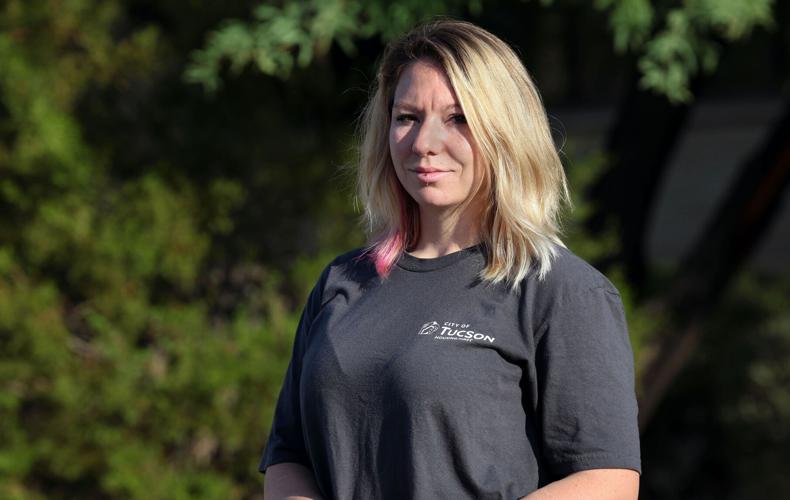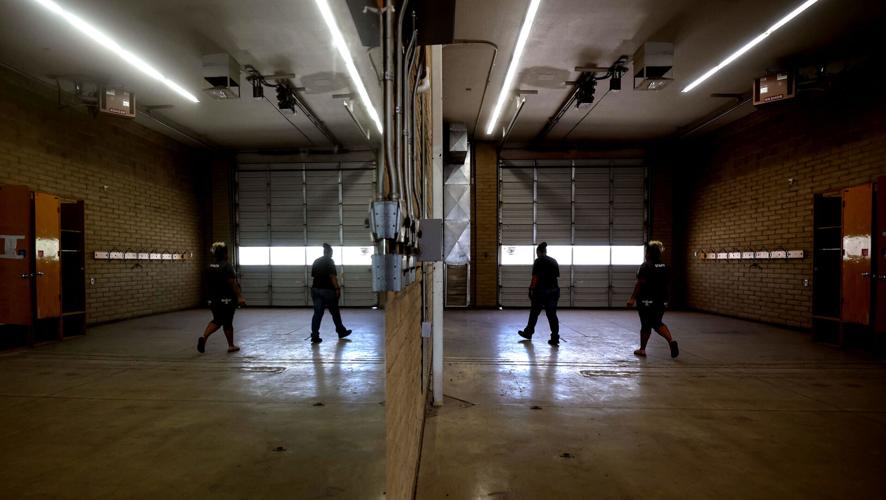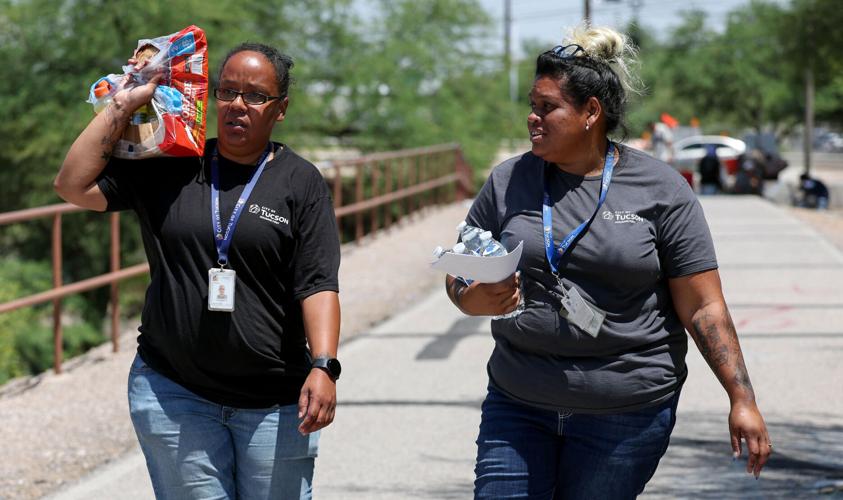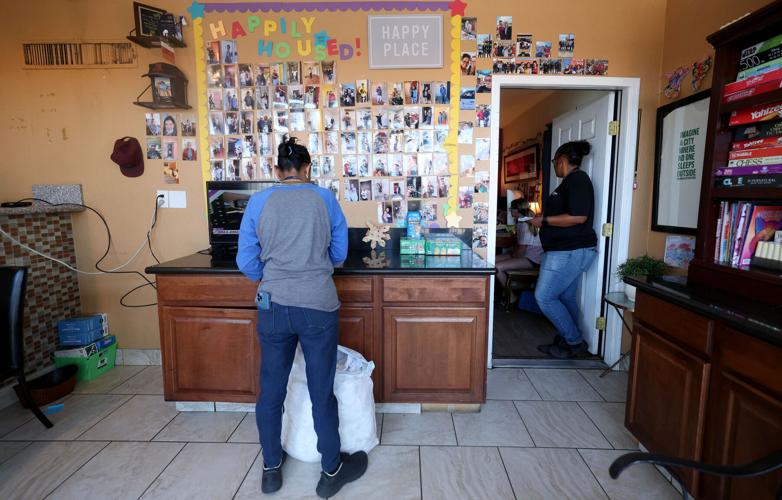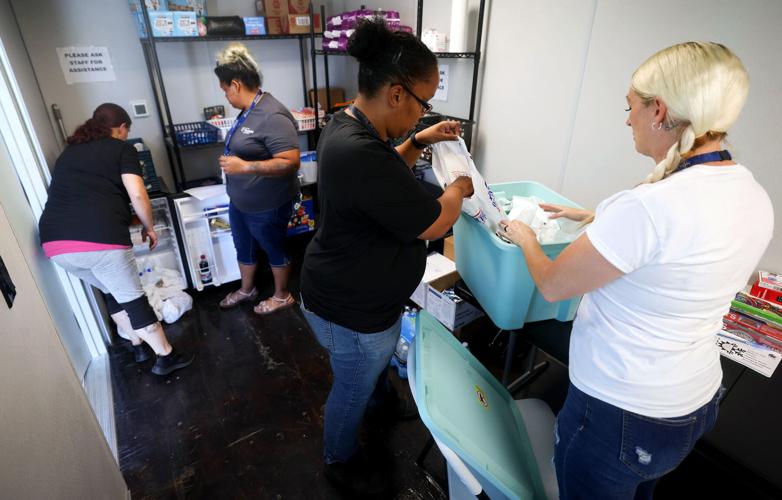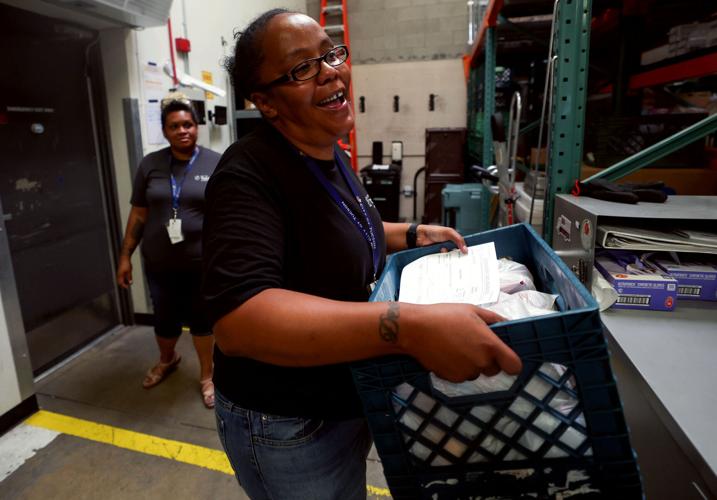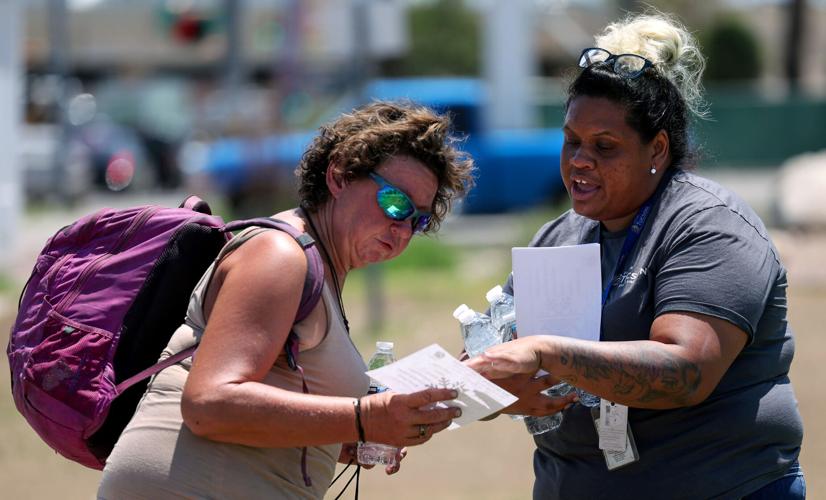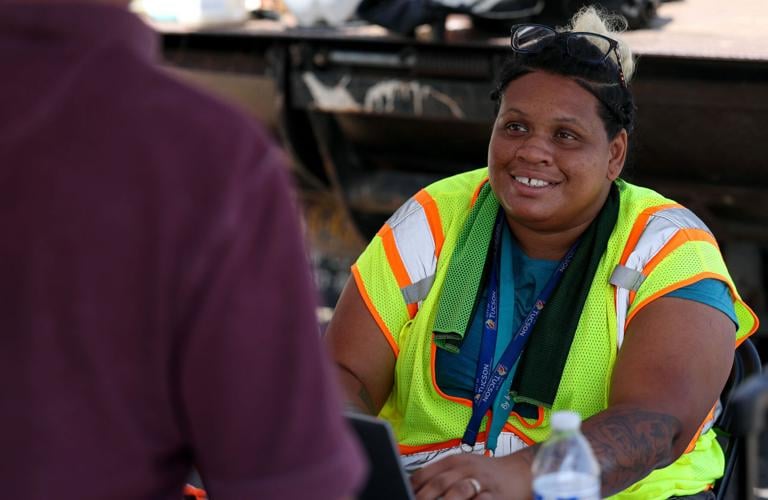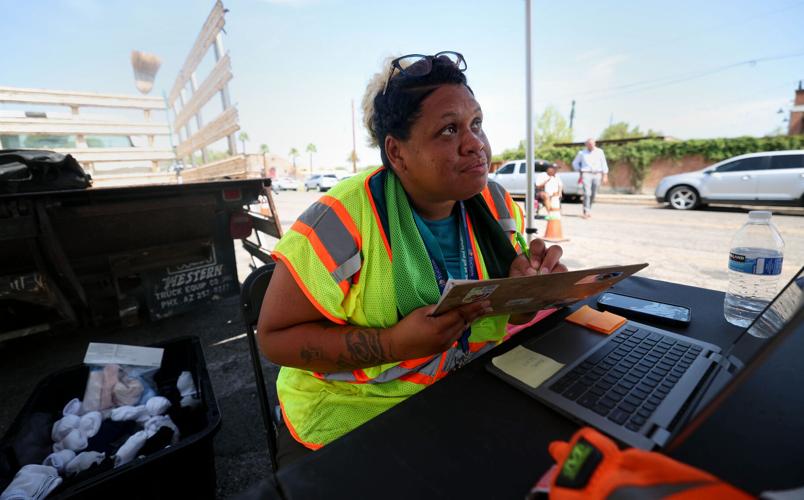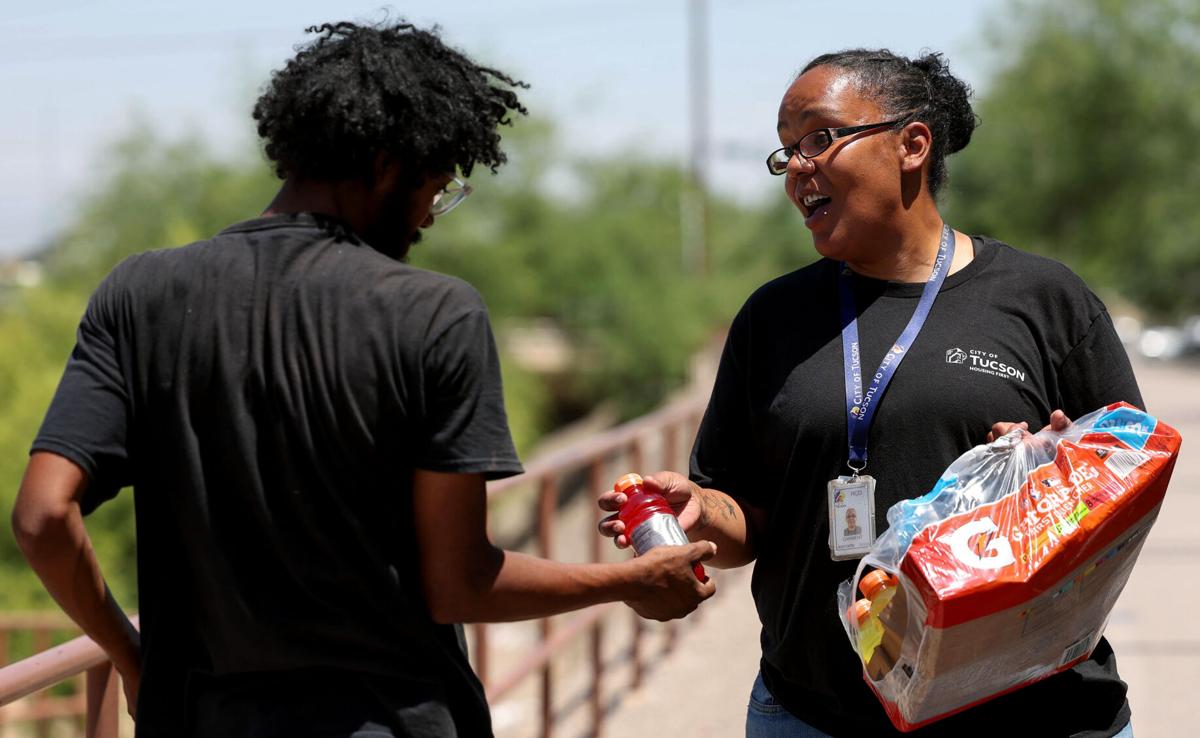Tucsonans Jeanette Garment, Zion Alderette, Kaya Newberry and Ashely Deal all have one thing in common — they were all once unsheltered.
From the obstacles they overcame, the dreams they have and the work they do through the city’s Housing First program to help end homelessness, these are their stories.
Content warning: This story mentions difficult topics like homelessness, death and addiction.
Jeannette Garment

Jeannette Garment collects lunch for residents of the Amazon Motel Housing from the Community Food Bank of Southern Arizona on July 12.
When Jeannette Garment’s sober living house unexpectedly closed nearly two years ago, she grabbed her only belongings — two backpacks — and took a bus to a shelter.
On the heels of being six months sober from methamphetamines, Garment feared that the sudden closure could thrust her into relapse.
Determined to find a solution instead of turning to the streets as she once did, she listened to a close friend who recommended the Wildcat Inn on Oracle Road.
After arriving at the hotel-turned-shelter operated by the City of Tucson’s Housing and Community Development (HCD) Department, Garment's friend went inside to speak with community services manager Allison Chappell.
But Chappell was in a meeting.
Knowing that this could be her opportunity to get off the streets and stay clean, Garment stayed. She waited over two hours for her chance to chat with Chappell.
“I was like, ‘OK, what else am I doing? That's all I have — is time,’” Garment says. “She came out and she talked to me and she heard my story and whatnot. And she's like, ‘Well, I have a room that's empty. But you're gonna have to clean it yourself.’ That was the kickstart that I needed. Because I've never really been one to ask for help, ever. I don't know if it's a pride thing. I don't know. But finally, in the end, I was able to ask for some help and it was given to me. Allison took a chance on me and I did not want to upset her or make her second guess bringing me in.”
Garment stayed as a resident at the Wildcat Inn for several months before getting a temporary job with the city.
It was during her time at the Wildcat Inn that Garment hit her stride. She stayed sober, created meaningful relationships with her colleagues and found her passion in life: helping those who are unsheltered.
Last year was a big year for Garment. She moved into her own apartment and began a permanent role as a housing services agent within the Housing First program of the HCD department.
As a housing services agent, Garment is typically the second person people see during the intake process at shelters. But for her, each day is never the same.
She mostly assists with whatever the Housing First program needs, like guiding newly sheltered individuals through the housing process and running to Sam's Club to pick up snacks for HCD shelters. You can also find her working at the HCD mobile shower trailer or one of the new cooling centers.

Jeannette Garment double checks her tasks for the day at the Wildcat Inn on July 12.
“It is a tough job. It's not fun all the time. But in the end, I do know that it's something that the clients need, that we need as a shelter and what we're trying to provide (for the community),” she says.
The tough times are all worth it when she has positive moments with clients, she says. When reflecting on her time with HCD, there’s one moment that stands above all others.
While working at the mobile shower trailer parked at the St. Francis men’s shelter on Fort Lowell Road last year, a man approached the trailer toward the end of their weekly shift.
The crew, including Garment, made sure the man was able to shower before they packed up for the day. Since it was toward the end of their day, they gave him a little more time than the traditional 15-minute time slot.
“He came out of the shower and I was like, ‘Do you feel better?’ He goes, ‘I feel amazing’ and he started to cry,” she says. “I was like, ‘Are you OK?’ And he goes, ‘No, I'm fine. It's just that even a few minutes in the shower makes you feel normal, lets you feel normal.’ And then he said, ‘I'm so glad that you guys were here.’”
“It's just the little things that you see from clients and people that you don't see every day, the gratitude and the appreciation that (we) are there. You don't have to see them every single day, but us being a presence in their life is something that they need, something that they appreciate. And I look forward to having those moments (with them).”

Jeannette Garment and Ashely Deal pass out water and Gatorade in the triple-digit heat in July.
Garment calls working with the local unsheltered community “a humbling experience,” and says the job has lifted a heavy weight from her shoulders.
Now, because of her position, Garment can pay her bills — and even displays a sense of excitement when talking about them, something most people dread discussing or thinking about.
“I get to be the type of person I was always supposed to be, just a responsible adult. Because before, I only worried about myself, I really did. I don't have kids, I don't have a significant other, so I only had to worry about myself. But I can't be that selfish. I really can't. So, I had a lot of weight on my shoulders that I didn't know I was holding,” she says. “And now, I have my apartment, I have car payments, I have two cats, so there’s something I have to care for. I feel like I'm finally getting into the mode of being a regular person.
“I'm always going to be an addict. I'm always going to be in recovery. So, that part is never going to go away, but I don't feel, now, that when I go out into the world that it sticks out like a sore thumb. That's not the first thing people see. When they see me, they don't see a former meth addict walking out. I'm just a normal 40-year-old woman who's going to work every single day with two cats. And I don't care if people call me a crazy cat lady. It's been a journey for sure, but a good one. A very good one. And I'm so glad I asked for help.”
‘We're all human beings, even the ones that don't have homes’
If you asked Garment when she was a child what she wanted to do when she grew up, she probably wouldn’t have said working in human services.
Instead, she would have told you about her love for large animals, specifically horses, and how she eventually wanted to become a veterinarian.
But growing up, Garment moved around a lot. She was born in Okinawa, Japan, moved to the United States with her adoptive parents when she was 3 years old and found herself on the East Coast before moving to California. She was moving around every 2-3 years, she says.
She eventually landed in Tucson but was unsheltered off and on for several years due to addiction.
“Ask me three or four years ago, I would say I don't like this place,” she says. “I wanted to get out but I was in the midst of my addiction then. I've always told my friends and people who would ask: if you can't get sober in the place where you used to use at, then you're not going to get sober anywhere else. Because the thing is, there's drugs and there's alcohol everywhere. So, I think now I'm able to give back to the community I was once a part of and it's one of those things where I never thought I was going to be in that position. But I welcome it now and I love it. I think Tucson is where I'm gonna stay.”
Throughout her bout with addiction, Garment says she would find herself sober for no more than 18 months at a time and only if she ended up getting arrested or placed on probation.
Now, Garment has been clean for over two years — partially due to that fateful decision she made two years ago to seek help at the Wildcat Inn.

Ashely Deal and Jeannette Garment exchange prepared meals for snack bags at the Amazon Motel Housing on July 12.
Earlier this year, Garment was recognized by Gov. Katie Hobbs for her work and received the Outstanding Achievement in Overcoming Homelessness award from the Arizona Housing Coalition.
Garment says she didn’t realize how much she enjoyed helping others until she got this job, adding that she’d work every single day if they’d let her.
“We want them (clients) to still feel that they're human,” she says. “We're all human beings, even the ones that don't have homes and we just want them to be able to realize we do care. There is someone that cares, as much as they might feel that there isn’t.”
Along with rekindling her passion for people, Garment’s love for horses is something that remains strong as she slowly finds herself getting back into working with them in her free time (when she’s not watching true crime documentaries, that is).
She hopes she can continue helping the unsheltered community find the hope and resources they need during dire times.
“Not everybody is an addict. Not everybody has mental health issues,” she says. “There's some people out there who are dealing with trauma from past, maybe even present, issues and to be able to give someone just a minute of their time, to not assume things and to just ask, a lot of us will answer if you just ask nicely and not be rude about it. So, I think it’s a humbling experience, for sure. And to realize that could be myself again if I'm not careful with how I live my life, it's like, ‘I could be in that spot in a park.’”
Zion Alderette
Years later, Zion Alderette can still recall the devastation following the loss of his beloved service dog, Charlie.
Charlie was more than a service dog for Alderette. He was a furry companion who was always by his side while Alderette was unsheltered off and on for several years. Charlie was family.
The loss pushed Alderette into a deep depression that left him with an overwhelming sense of guilt and sadness, he says.
But the loss of Charlie, and the depression that followed, was one of the factors that led to Alderette accepting housing resources, getting clean and turning his life around for the better.
“That was one of the things that I quickly realized, that you cannot function like that no matter how hard you try,” he says. “That was not going to get me anywhere. But I felt like I was worthy and deserving and I am so glad that I did go to rehab.”
During his time with Charlie, Alderette would do everything in his power to make sure his companion was taken care of. He would even trade personal items to get dog food if he couldn’t obtain it himself.
After Charlie’s death, Alderette swore he would protect his other dog, Ginger, with everything he had. While sitting behind Costco on the city’s east side, Alderette would stay up all night to ensure Ginger was safe.
“I would stay awake all night and then hop on the bus, stay on it for one hour of sleep and then hop on the next one, sleep and then just repeat that cycle for eight hours until I felt like I had gotten enough sleep,” he says. “After that, I had gotten some of the resources that we (HCD) provide.”
If you’re thinking his name sounds familiar, you may remember part of Alderette’s story from our article about the HCD mobile shower trailers, when he shared some of the hurdles he faced while being unsheltered — including not being able to shower for three months straight during the summer.
Similar to Garment’s story, Alderette found himself moving around a lot while growing up. Some places he lived include Phoenix, New Mexico, Texas and Louisiana.
Alderette has been on his own since he was 15 and has faced off-and-on homelessness since then. His longest stretch of being consistently unsheltered was for nearly three years.
“I was like, ‘OK, I'm going to stop in Phoenix for a little bit, see what I can do there,’” he says. “I went to the Human Services Campus and I wasn't able to obtain shelter there. So, I tried to go down to LA but I got stuck in Blythe (California). And then I ended up back down in Phoenix and then somehow I ended up back in Texas. It was just literally trying to go to different places, different states, different cities to just obtain these resources that I obtained here.”
When he eventually ended up in Tucson less than five years ago, he remained unsheltered sporadically due to a divorce and a methamphetamine addiction. Alderette didn’t have a set space in Tucson and would frequently move around the outside of stores, in washes and within the 100-Acre Wood Bike Park.
Alderette started his Housing First journey as a client and worked diligently to get sober and establish housing. When he was no longer a client of the program, he decided to give back as a volunteer.
Almost every week, Alderette volunteers at the Wildcat Inn, Amazon Shelter and local food pantries and even participates in the St. Francis Shelter Community’s Soup Patrol. He also volunteers at the HCD mobile shower trailer and helps organize group arts projects at the shelters.
His volunteer work and kind personality later earned him a spot as an assistant in the city’s housing department.
“It's life-changing because I literally went from sleeping under bridges and tunnels and behind people's businesses out in the desert, literally out in the desert. I've slept in front of businesses when it was snowing down here,” he says. “So to go from that to saying that I am now working with the city, I am now working with individuals that are unsheltered, I am now assisting those individuals to become productive members of society and also help fulfill their dreams that they have — it's mind-blowing. I'm still in disbelief at times.”

Jeannette Garment and Ashely Deal walk through the former fire station where a new homeless shelter may be built.
Alderette credits Housing First outreach coordinator Justin Hamilton with helping him accept the resources he needed during a dire time in his life. Now, he wants to be that person for the unsheltered community.
“It's been a rollercoaster because I myself had to adjust and I'm still getting my bearings. It's definitely a long process and having a roof over your head is just one step,” he says. “But the effects of it longterm is definitely a journey. So for me, I'm just grateful that I have the ability to do something that one person was able to do for me initially and get me started on that process. And to meet somebody wherever they're at in their little journey, in their journey for stability, it's a blessing.”
“It's not something that everybody can say, that they have that impact on somebody's life. And for me, I know firsthand what it means to have someone believe in you, to have someone say that you're worthy, to have someone say, ‘You can do this and here are the steps and here are the resources.’”
‘Everybody is deserving to live a fulfilling life’
Alderette has dreams of one day becoming a lawyer to help provide fair representation to previously unsheltered people and those with criminal backgrounds.
But these dreams weren’t even a thought when he was a kid. He didn’t think he would make it past the age of 16.
“That was the reality that I faced,” he says. “It was either you're going to pass away by the time you're 16 or if you keep living how you’re going, you're going to end up in prison. I came to terms at a very young age that I was going to become a product of my environment and be just like everybody else that I saw within my biological family, my neighbors, my community. That’s how everybody else was, so that was my expectation and I didn't really have any plans after that.”
The now 32-year-old says he feels like he’s defied the odds and he’s grateful he made it past the expectations that he and his surroundings set for him.
Despite working in human services daily, Alderette still enjoys volunteering in his spare time. When he’s not volunteering, he enjoys shopping and working on creative projects like painting a dresser he bought.
Of course, his favorite activity is hanging out in his backyard and spending time with his beloved dogs, including Ginger.
“Everybody is deserving to live a fulfilling life, everybody is deserving of having support, everybody is deserving of being treated as if you're human,” he says. “Something that a lot of people don't realize happens when you do (or say) certain things and you treat people like they're just trash or disposable or replaceable or that they're unworthy ... and just because of the circumstances that they're in now, that they're only going to be that one set thing ... It’s like placing them in that square box of, ‘OK, you're homeless, you're only going to be homeless, you're gonna have nothing to contribute to society.’”
“We have Jeannette, Ashely, Kaya, we have these individuals that I am so fortunate to be surrounded by and we have these individuals that are with other organizations as well, that have these lived-in experiences ... The human aspect is one thing that I like bringing (to this work) and bringing that humanity back is very impactful.”
Kaya Newberry

Kaya Newberry serves as a navigator on the multidisciplinary outreach team in the Housing First program, working with nurse practitioners and medical assistants to provide resources and care to people who are unsheltered.
Kaya Newberry starts her mornings by loading up a City of Tucson truck with first-aid kits, aloe, cooling pads, sunglasses, clothing, bags of food and water.
While these items may seem like they’re for an upcoming vacation, they’re actually supplies to be given to unsheltered folks in the community.
After the supplies are packed up, Newberry and the rest of the multidisciplinary outreach team head to designated areas in the community.
“We just want to make sure that we have the tools necessary to give out to the folks that we're working with and then being loaded up with knowledge of local resources and availability at the shelters. ... We go and we talk with people, we see what it is that they need. I meet people and I give them a care packet (of resources),” Newberry says.
As a navigator on the multidisciplinary outreach team in the Housing First program, Newberry works closely with nurse practitioners and medical assistants to provide resources and care to people who are unsheltered.
“I feel like we're out there just kind of saving lives,” she says.
Working in the Housing First program isn’t Newberry’s first rodeo with human services. The 26-year-old previously worked with local youth at Goodwill’s Youth Reengagement Center.
Around a year ago while working with Goodwill, she began connecting with other human services agencies like HCD, where she connected with Housing First director Brandi Champion.
When the department’s new multidisciplinary outreach team was developed, Newberry applied and landed a job with the city.
“I figured helping the youth was a good starting point for me,” she says. “And the first time I went and did outreach and I saw all these different providers from different agencies just coming together and collaborating and bringing services directly to individuals who are unsheltered, I fell in love with it.
“Just the whole mission behind it and seeing everyone work together as a team and showing up with their different strengths, whether it was their inner strength as a person, but also the strengths that their different agencies had. ... I just knew in my heart that that's something I wanted to do. I wanted to be, kind of, that first focal point of communication and it was really touching to be able to see that we could actually help these people and go and make a difference.”
Even though Newberry has been with the multidisciplinary outreach team for a short amount of time, she already has memories of working with the community that will stick with her forever. While working at the 100-Acre Wood Bike Park, she met a couple who were reluctant to work with the housing department.
The woman, who was pregnant at the time, didn’t believe that the team would help her but slowly and hesitantly trusted them.
With assistance from other agencies, the housing team was able to help her get the resources she needed to get clean, find temporary housing and eventually take her baby home.
Months later, Newberry was a passenger in a City of Tucson truck when the woman spotted her and called her cell phone.
“She hadn't seen me since a warm hand-off that happened between another agency for her case management. And she called me and she told me ‘thank you’ and updated me with all these amazing, amazing things that were going on in her life,” Newberry says. “She went from being really stuck in a dark place and she trusted us to walk her through some things, but ultimately, she did a lot of that work on her own.
“It just feels so good because we believed in this girl. We kept our word with her. And she ended up getting into a place and she's got her baby and she's doing really well for herself. She's killing life right now and it's amazing, you know? So doing that, I wasn't expecting to talk to her or anything again, but she randomly saw me and thought to say ‘thank you’ and I really appreciated that. I thought it was pretty special.”
Newberry has first-hand experience with being unsheltered, pregnant and addicted. She even had the threat of going to prison looming over her.
She says getting pregnant with her son two years ago was the wake-up call she needed to accept local resources and begin down a positive and productive path.
“That scared me enough into wanting to change,” she says. “I was in a really unhealthy domestic violence situation, while also being strung out and I knew that I was going to go to prison. And I was like, I'm not mentally, emotionally or physically strong enough to go to prison and be pregnant and potentially give birth in handcuffs.”
Between the ages of 15 and 24, Newberry was unsheltered and institutionalized, she says, which she describes as either being in jail or a treatment center. Back then, she faced a methamphetamine and alcohol addiction.
On her journey for a better life, she couch-surfed to try to stay clean, earned her GED and worked through a 12-step program.
“I got my license back, I got my family back and I have really amazing people and friends in my life today,” she says.
‘It took perfect strangers loving me and believing in me for me to be able to get to where I am today’
Newberry feels like she was destined to work with people in some capacity.
As a teenager, she dreamed of becoming a child psychologist or a medical examiner. Afraid that she might hurt live humans, she thought the safest bet was working with the deceased, she says.
Despite working in a mentally and emotionally taxing field, Newberry says the work is fulfilling and a daily reminder to be thankful for the struggles she experiences now because the problems she currently faces are nothing compared to what they used to be.
“The work that we do is really important,” she says. “I feel honored every day being able to come into work and to do what I do with the people I work with ... I love the work that I do and it's really an honor to be a part of this team. Everyone deserves housing and everybody deserves to have somebody come into their life at some point and tell them that they’re worth it. You deserve to thrive and you deserve to live a better life than what you got now. That goes for people in houses, too. Honestly, we get caught up with that.”
Although Newberry is still finding her bearings, she hopes to go to college, get her voting and other rights restored and continue giving back to the community.
“I believe that I could do anything that I wanted to,” she says. “That might take some time and it might take grit and some extra finances, but I really believe that me, as a person, I could do anything that I wanted and that the world is kind of my oyster. So, I know I want to go back to school, but I also know I don't want to overwhelm myself just yet. I'm looking forward to the future and seeing what it holds.”
Most days at work are slightly unpredictable as she doesn’t know exactly where she’ll go or what to expect when arriving. But when it comes to relaxing in her time off, some things remain the same.
She loves going to the gym and checking out a local punk or hardcore rock show. She also loves cooking. Lately, she’s particularly loved making Asian-style curries and stir-fries.
“I remember when I was in a place in life where I didn't believe in myself and I had a hard time trusting people,” she says. “And there were experiences that I had where people basically said, ‘If you show up for yourself today, I'm going to show up for you as well.’ And when they said that, it did something to me. It changed me. I felt inspired to follow through with things and to not back out and I needed that. I needed that support.
“And I did show up for myself and people did show up for me back, so that's really the experience that I look forward to giving back to others in the community because it took perfect strangers loving me and believing in me for me to be able to get to where I am today.”
Ashely Deal

Ashely Deal signs in guests waiting to use the portable showers outside of the Primavera Foundation on July 18.
Ashely Deal was unsheltered for six years before she became a resident at the Wildcat Inn nearly two years ago.
With her fiancé just released from jail, the two went to rehab to detox following a methamphetamine addiction along with mental health concerns.
The mother of six (now nine including her fiancé's three children) ages 2 to 15 knew it was time for a change when she lost custody of her youngest son.
“It was the fact that my son was taken away,” she says. “And that was my last son out of all my kids. I was also just tired of being tired, you know? Just chasing the high, it was no more of what I wanted, it was more of — I wanted to be in my kid's life. And I want to be my parents' daughter again and be an older sister like I was before. I wanted that to be that. And I did. And I'm still going.”
Similarly to Alderette, Deal’s name may sound familiar as part of her story was featured in our article about the HCD mobile shower trailers.
At the time, Deal was a regular HCD volunteer and told #ThisIsTucson: “I’ve seen a lot of reactions from people showing up in areas where we locate and they're really happy to take a shower. Now, honestly, I wish this was here when I was homeless.”
When Deal arrived at the Wildcat Inn two years ago, she says her experience was nothing short of a blessing.
“It was really great because I had a second chance at being normal and being out and doing responsible things,” she says. “It was a blessing because I didn't have to be out there in the heat and stuff and I was working on myself and doing things to get my son back.”
Around the time Deal established housing, she was able to get her son back. Her other children, although born here in Tucson, currently live in El Paso with her father. They come to visit on the weekends when they can.
As someone who has endured and conquered a life of being unsheltered along with a plethora of other hardships, Deal wants to help others who are experiencing similar obstacles. She joined the Housing First program as a housing services agent less than a year ago.
“It's about giving back to them, especially to the ones that really need it,” she says. “I've been in their shoes and some want help but then they have to do it on their own. And I wish I can help them with that, but it's a difficult thing. A lot of them that we do see are really just thankful that we're here. It really just makes me want to do more.”

Ashely Deal signs in guests waiting to use the portable showers outside of the Primavera Foundation on July 18.
Working in an environment where you’re surrounded by trying situations can be challenging. At times, it can take its toll.
“I ain't gonna lie. Sometimes working, especially with what I do, helping people, sometimes I do get triggered, but I have staff members here that I do get to talk to so that I can have a safe place to ground myself,” she says. “In the beginning, it was hard. However, just connecting with my family and certain people and making new sober friends, it's been good. Sometimes there are difficult situations on the road, but I'm able to get on with my life and have a better solution on certain situations.”
‘Every day just keeps me going’
Most days, you’ll find Deal working at shelters checking on clients or making sure everything is running smoothly at the program’s new cooling center and shower trailer.
When she’s not working, her favorite thing to do is spend time with her family. Her girls enjoy makeup and often use their mom as a guinea pig, she says. Her boys, on the other hand, love watching TV — everything from “Baby Shark” to shows about dinosaurs.
“We do a lot of family time and go out to the park and swimming and all that,” she says. “It just gives me more memories that I can remember later.”
Growing up, Deal never thought that she would end up where she is now.
She believed that she would become a teacher, or work at Burger King like her mom did if teaching didn’t work out. (She did end up working at Burger King, but has since moved on.)
“I never thought I would be in this environment because I thought when I was a recovering addict, ‘Who's gonna hire me?’ But this gave me a totally different picture,” she says. “And I'm really happy that I got into this field because it's just amazing. Every day is something new, every day just keeps me going.”

Ashely Deal, right, offers information about local cooling shelters while handing out water bottles by the Santa Cruz River in July.
Now that she’s found a job that she’s passionate about, Deal looks forward to furthering her career in the HCD department — slowly and steadily, she says. And of course, she looks forward to maintaining her sobriety so she can be the mom and community member she’s always wanted to be.
“We do care and (people need to) be patient because it may take some time. Look at me, it took me six years,” she says. “But also, we are here. We are trying to help the community out there. Every time we go down the street or something like that, it hurts my heart and it makes me cry a little. I always say, ‘That used to be me.’ But we just got to push people and keep on pushing and they’ll come.”


